
Perhaps one of the most revolutionary players to ever play the game of hockey, Maurice Richard brought hockey in Montreal to an elite level and set the bar high for every generation to come. Richard overcame nearly every level of adversity to become the greatest hockey player of his generation and one of the best in NHL history.
Maurice Richard was born into a poor family in August of 1921. He was the oldest of eight children and did not have an opportunity to begin playing hockey until he was fourteen years old. He led his local team to three straight league championships and scored 133 of his teams 144 goals. He was prolific and bound for greatness, even though he’d dropped out of school at sixteen to help his father make money for their family. At age eighteen, be began his quest to become a professional hockey player after trying out for the Verdun Juniors. He was promoted after his rookie season with Verdun to the Quebec Senior Hockey League where he played for the Montreal Royals.
Maurice Richard: Overcoming Adversity
Richard suffered his first major injury in his first game with the Royals when he crashed into the boards and broke his ankle. He would miss the entire season. He then was called to the Canadian Military Recruitment office for duty but was turned down because of his ankle injury. He took the year to get healthy and returned in 1941 to his QSHL team. He played in the first thirty-one games of the season and scored seventeen points before breaking his wrist. He would rejoin the team during the playoffs and perform well enough to earn a tryout for the Montreal Canadien NHL club.
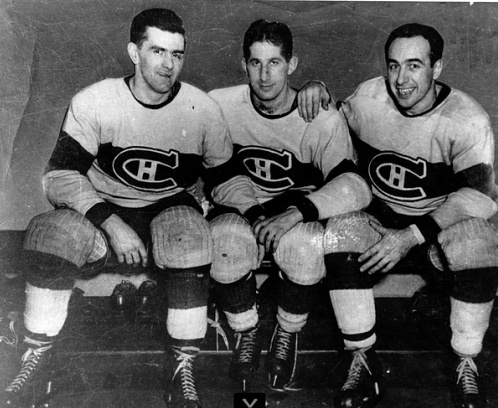
Maurice Richard, Elmer Lach and Toe Blake.
Due to many players leaving for War and many fans refusing to attend games due to lack of French-Canadian players, Richard was called up to the NHL and made his debut in the 1942 season opener. Only sixteen games into the season, Richard suffered another broken leg. He recovered and tried to join the Canadian army to defend his country but was deemed ineligible for combat.
Richard had experienced enough humiliation and doubt and trained even harder during the off-season to be ready for the new season. His first daughter was born at the onset of the 1943-44 season which prompted Richard to change his number to nine, and thus, the Rocket was born.
Maurice Richard Takes Over
The 1943-44 season was Richard’s welcoming party into the NHL. In his first full season, he appeared in forty-six games and led the Habs in goals with thirty-two. He then led the way with twelve scores in the playoffs in route to Montreal’s fifth Stanley Cup. This was also the first of fourteen straight seasons that Richard would be named an All-Star.
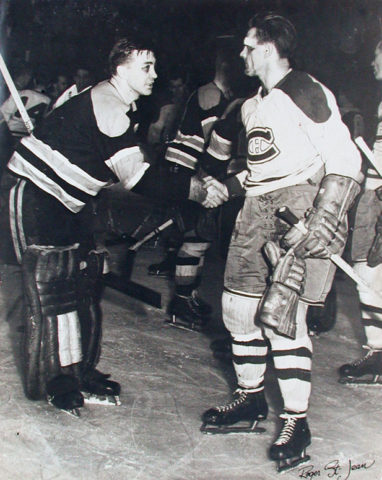
The next year would put Richard in the history books forever as he became the first player to score fifty goals in a season and doing so in just fifty games. He would lead the league in goal scoring four more times in his career on his way to becoming the first NHL player to score 500.
Along his scoring journey, he eclipsed Nelson Stewart’s goal record of 324. November 8th, 1952, the “rafters shook” (according to the Montreal Gazette) as Richard 325th career goal in the second period, one of the greatest moments in hockey to this day.
Maurice Richard and Clarence Campbell
For most hockey fans who aren’t taught Canadian, and in specific, Quebec history, one wouldn’t recognize just how important Maurice Richard was to the French-Canadian people of Quebec. The Montreal Canadiens, often referred to as the Habs, were named that because of their heritage. When France settled Quebec in the 17th Century, they were referred to as the “les habitants”, the settlers of New France. In 1909, when the team was founded, they were given the name, formally Le Club de Hockey Canadien, to appeal to their mostly French-Canadian population.
As time went on, the ownership changed and during the Richard era, ownership lost interest in the importance of French culture and did not speak French themselves. They refused to give Richard and team Captain Emile Bouchard salary increases after the 1948 season which started the turmoil in the city and organization.
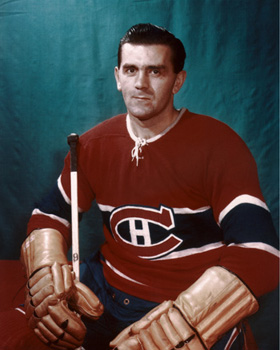
Maurice Richard.
Opposing players knew how to get under Richard’s skin by insulting the French culture. This often times led to vicious fights, because Richard was a countryman with pride and never backed down. NHL President Clarence Campbell often brought the hammer down hard on Richards and the opposing players rarely received equal punishment.
Late in the 1955 season, Richard took a slash to the head and by Boston Bruin Hal Laycoe. Referee’s paid little attention to the hit and Richard went on the offensive to defend himself and returned the favor to Laycoe with a stick to the head. During the altercation, Richard punched a referee. Boston police tried to arrest Richard but Bruins officials swayed that attempt. Two days later, Richard was suspended for the remainder of the season and the playoffs.
The Maurice Richard Riots Begin
The following weeks and months would be hell for Campbell as Richard supporters sent death threats and threw objects at him at every chance they had. In one particular incident, an enraged fan throw a gas-bomb at him in the arena which caused the game to be forfeited in the opponents favor. This was the beginning to the Richard Riot.
Over 20,000 fans took to the streets and demolished the surrounding area of the Forum. Nearly one million dollars in damage was accrued (adjusted to 2014 money) and more than seventy people were arrested. The next morning, Richard took to the radio and told his fans to “Do no more harm. Get behind the team in the playoffs. I will take my punishment and come back next year and help the club and the younger players to win the Cup.”
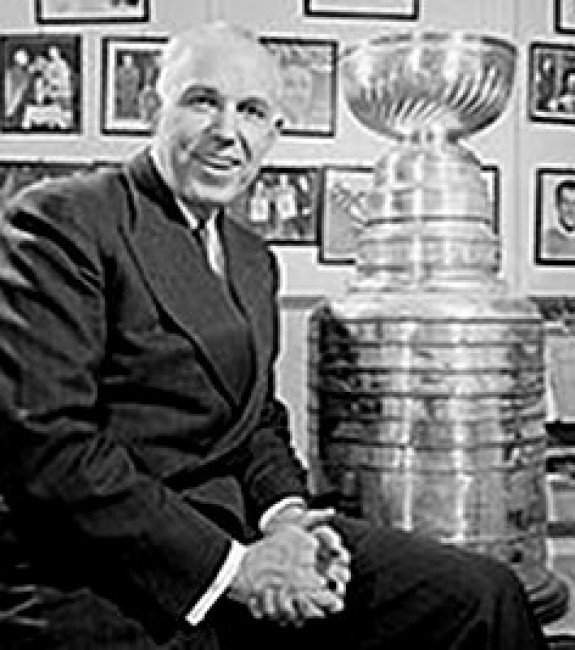
Clarence Campbell.
The Canadiens would fall in game seven of the Stanley Cup championship and Richard lost the points race by one point.
Richard returned the following season and led the Habs to a Stanley Cup win and was then named captain of his team. On October 19th, 1957, Richard would score his 500th career goal. He also would lead his team in scoring in the playoffs as the Canadiens won their 3rd straight Cup and would go on two win another two in a row with Richard leading them.
Richard was finish his career with eight Stanley Cup titles, 544 goals with another 82 playoff goals and over 1000 penalty minutes. He was elected into the Hockey Hall of Fame just one year after retiring and the Canadiens retired his number 9 jersey in 1960.
Maurice Richard’s Legacy
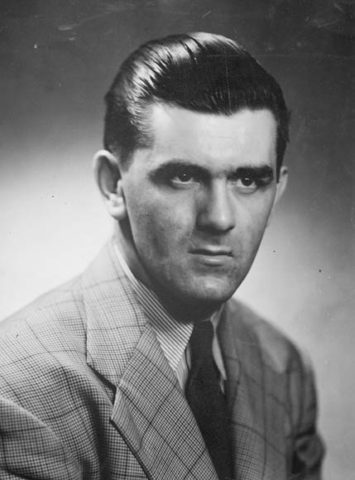
Richard filled the net at the old Forum 324 times. (Library and Archives Canada)
Richard is a hero in Quebec. Many note that the Richard riot was the beginning to the Quiet Revolution in Quebec as French-Canadians began voicing their displeasure and looking for ways to keep the heritage and culture in tact.
Richard overcame violent attacks from defenses and injuries his whole career. His numbers are remarkable when you take into account all the games he missed due to injury. This only adds to his legacy as a hockey great. He came from humble beginnings and fought for the culture he believed in, by way of sport.
The great Nelson Mandela said, “Sport has the power to change the world,” and sometimes, it takes an icon like Maurice Richard to stand up for his fans. Not only will Richard be forever remembered in the hockey world, he’ll forever be a hero in the Province of Quebec.
The NHL decided in 1998 to name the award for highest goal scorer after the Rocket. The following season, Richards was at the Awards Presentation when he awarded another hockey legend, Teemu Selanne, the inaugural Maurice Rocket Richard Trophy.
Months later, Richard lost his battle with cancer and passed away on May 27th, 2000. He was given a State Funeral and over 115,000 people came to the viewing to pay their respect.
Most of us didn’t get to watch Richard in his prime and have only photographs and history to know him by, but never under-estimate the impact he had on modern day hockey and society. He will forever remain a Hockey God and rest-assured, his legacy in Montreal lives on.
This post was originally published in May, 2014.